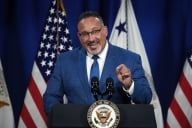You have /5 articles left.
Sign up for a free account or log in.
More medical colleges are managing conflicts of interest in clinical care, but most still do not meet national standards for dealing with conflicts, according to a study released Friday by the Institute on Medicine as a Profession. Researchers looked at medical colleges' policies in 2011, and found that nearly two-thirds of medical colleges did not have policies to limit ties to industry in a least one of the areas the study examined, which included gifts, meals, drug samples and payments for travel, consulting and speaking. None of the 133 medical colleges met all of the standards for the 12 areas examined, but a number of medical colleges made progress toward national standards since the institute's previous study, based on 2008 data. The proportion of medical colleges with no policies dropped from more than 25 percent in 2008 to less than 2 percent in 2011.
“We are pleased that the authors recognize the substantial efforts that medical schools have taken over the past several years to strengthen their conflict of interest policies,” said Heather Price, senior director of science policy for the Association of American Medical Colleges.
A majority of the medical schools have no policies or permissive policies for accepting drug samples and industry-funded continuing medical education, consulting, honoraria and speakers’ bureaus, according to the study. The findings should prompt medical school administrators to “take bolder steps to rid medicine of industry influence and preserve public trust,” said David Rothman, the institute's president and the study's co-author.








